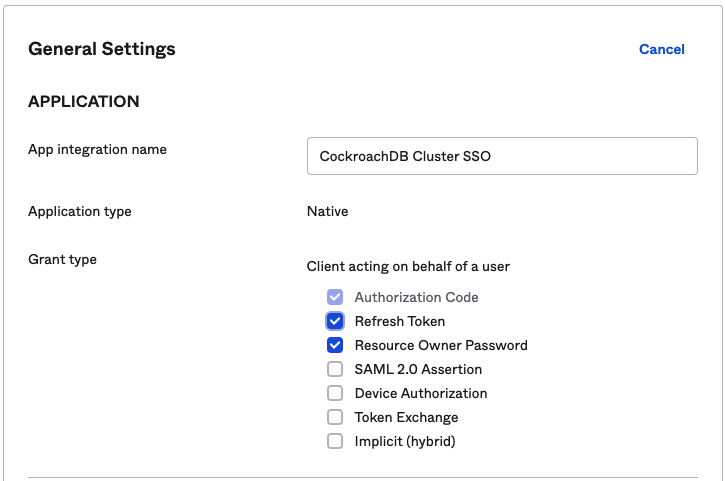Using Short-Lived Tokens To Authenticate Python Applications to CockroachDB
JWT tokens can replace passwords for a safer and more secure cloud-native future. Follow this tutorial to get JWT AuthN working with your Python application.
Join the DZone community and get the full member experience.
Join For FreeMotivation
In my previous article, I demonstrated how JWT tokens can replace passwords for a safer and more secure cloud-native future.
Check out my previous articles covering SSO for DB Console using Google OAuth, Microsoft Identity Platform, and Okta.
High-Level Steps
- Provision a CockroachDB cluster
- Configure Okta
- Write code
- Verify
Step-By-Step Instructions
Provision a CockroachDB Cluster
SSO for SQL can be set up for CockroachDB self-hosted and our hosted offerings (learn how to set up a dedicated cluster). I'm using a Docker environment with the latest 22.2 beta image where this capability is available.
Configure Okta
I am using an Okta developer account.
Assuming the steps from my previous article are finished, you may go ahead and follow this tutorial to get JWT AuthN working with your Python application.
The application we're going to use as an example is our Python Psycopg3 tutorial. We are going to demonstrate how we can request an id_token for the initial authentication and in the case of a long-running Python application, demonstrate how we can request a refresh_token to swap id_token with a new one.
The first order of business is adding the ability to refresh tokens in our Okta console.

At this point, we're going to pull down the application code and attempt to run it.
Write Code
We need to set up a few environment variables to keep sensitive information out of the code base.
export OKTAURL=https://dev-number.okta.com/oauth2/v1/token export CLIENT_ID=<okta-client-id> export CLIENT_SECRET=<okta-client-secret> export OKTAUSERNAME=<Okta user> export OKTAPASSWORD=<Okta password>
Refer to the previous article for where to find the properties.
The very first change I want to tackle is changing the application's dependence on $DATABASE_URL variable. I'm using the psycopg3 practice of setting up a connection. For example:
with psycopg.connect("host=lb dbname=defaultdb user=roach password={} port=26257 sslmode=verify-full sslrootcert=/certs/ca.crt options=--crdb:jwt_auth_enabled=true".format(id_token), application_name="$ using_jwt_token_psycopg3", row_factory=namedtuple_row) as conn
I am adding the options parameter, options=--crdb:jwt_auth_enabled=true and also passing the JWT token as an argument, i.e. password={} and .format(id_token).
The goal here is to codify the following curl command:
curl --request POST \ --url $OKTAURL \ --header 'accept: application/json' \ -u "$CLIENT_ID:$CLIENT_SECRET" \ --header 'content-type: application/x-www-form-urlencoded' \ --data "grant_type=password&username=$OKTAUSERNAME&password=$OKTAPASSWORD&scope=openid"
I am using the requests module to implement this logic. Since we're going to also refresh our tokens, we have to add a slight change to the command, i.e. offline_access as per the Otka documentation.
--data "grant_type=password&username=$OKTAUSERNAME&password=$OKTAPASSWORD&scope=openid offline_access
If you compare my code with the original version, you can see I have a call for a token:
json_response = get_id_token(url, data, headers, client_id, client_secret)
id_token = json_response["id_token"]
refresh_token = json_response["refresh_token"]
The result of the function is sent back as a JSON object. I extract the id_token and refresh_token for the consecutive call.
def get_id_token(url, data, headers, client_id, client_secret):
r = requests.post(url, data, headers=headers, auth=(client_id, client_secret))
return json.loads(r.text)
If you have a short-lived application, you can stop here and perhaps discard the refresh token but in case your application runs as a service, the next call will include the refresh_token as part of the payload to generate a new id_token. We are trying to codify the following curl example:
curl --request POST \ --url $OKTAURL \ --header 'accept: application/json' \ -u "$CLIENT_ID:$CLIENT_SECRET" \ --header 'content-type: application/x-www-form-urlencoded' \ --data "grant_type=refresh_token&scope=openid offline_access&refresh_token=<refresh-token-goes-here>"
I concatenate the refresh token in the data field.
data = "grant_type=refresh_token&scope=openid offline_access&refresh_token=" + refresh_token
json_refresh_response = get_id_token(url, data, headers, client_id, client_secret)
new_id_token = json_refresh_response["id_token"]
I am going to stop here, but in your long-running application, you will continue this loop by passing each consecutive refresh token to a new request and renewing your tokens.
Verify
If we were to execute the application as is, the output will be:
Initiate authentication with a new id_token: Balances at Thu Oct 27 19:59:38 2022: account id: 12df8892-1800-4f91-afde-2f0742e9757e balance: $250 account id: a6f5618e-5301-466c-ba9b-1bb67cedb39c balance: $1000 Balances at Thu Oct 27 19:59:38 2022: account id: 12df8892-1800-4f91-afde-2f0742e9757e balance: $350 account id: a6f5618e-5301-466c-ba9b-1bb67cedb39c balance: $900
The following output is generated by the refreshed id_token:
Initiate authentication with a refreshed id_token: Balances at Thu Oct 27 19:59:38 2022: account id: 11f31444-5271-4ad2-9dcd-3d1245d4faf5 balance: $1000 account id: 3c52d759-8790-45fc-9a3a-f31027b64398 balance: $250 Balances at Thu Oct 27 19:59:38 2022: account id: 11f31444-5271-4ad2-9dcd-3d1245d4faf5 balance: $900 account id: 3c52d759-8790-45fc-9a3a-f31027b64398 balance: $350
Finally, I am passing a fake token to demonstrate that the cluster will reject it.
Initiate authentication with a bogus id_token: CRITICAL:root:database connection failed CRITICAL:root:connection failed: ERROR: JWT authentication: invalid token
We can also run this workflow manually by accessing Cockroach without a password:
cockroach sql --url "postgresql://roach@lb:26257/defaultdb?sslmode=verify-full&sslrootcert=%2Fcerts%2Fca.crt&options=--crdb:jwt_auth_enabled=true"
If you enter an invalid token:
Connecting to server "lb:26257" as user "roach". Enter password: ERROR: JWT authentication: invalid token SQLSTATE: 28000 Failed running "sql"
Hopefully, you were able to follow along. If you have any questions, feel free to leave a comment below.
Published at DZone with permission of Artem Ervits. See the original article here.
Opinions expressed by DZone contributors are their own.

Comments